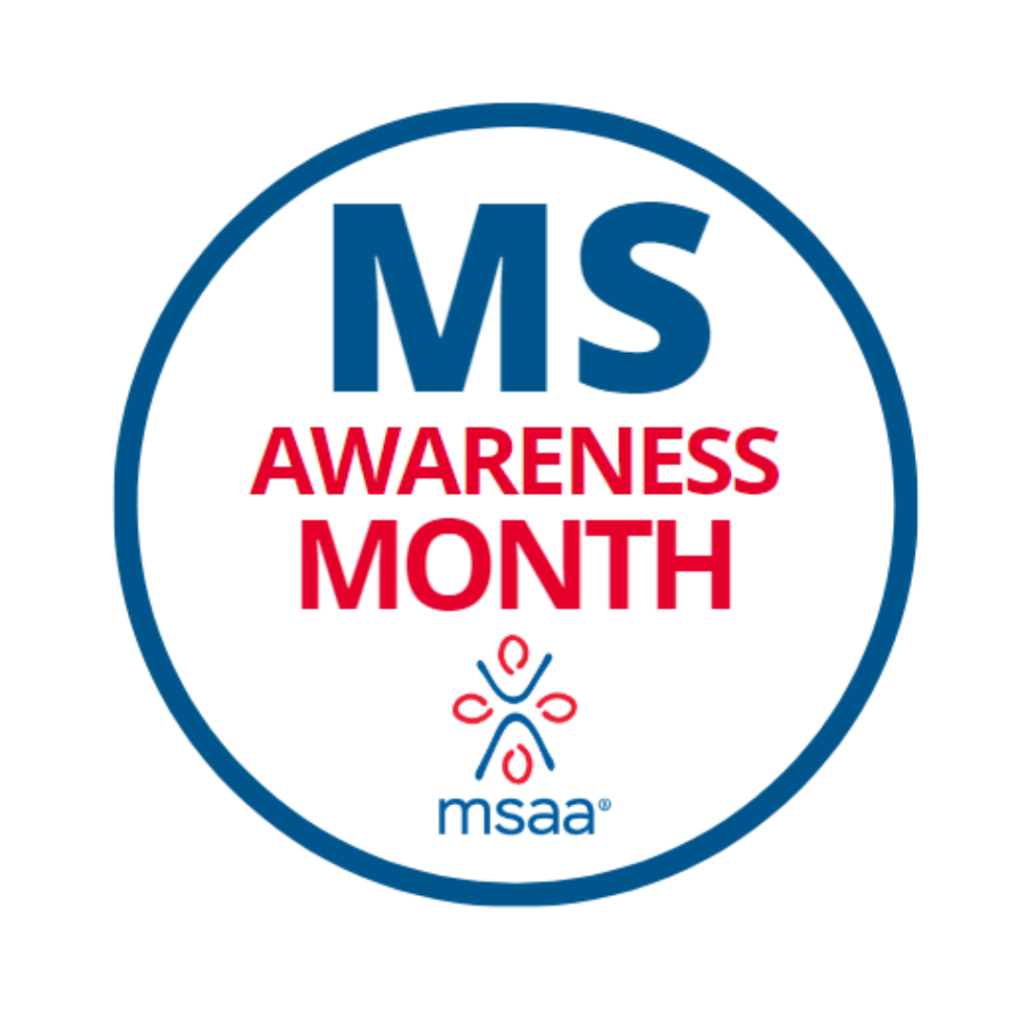March is Multiple Sclerosis Awareness Month and MSAA is excited to present four full weeks of valuable and inspiring resources, programs, and strategies for all ages! We are dedicated to spreading awareness, education, and support to individuals, families, and care partners in the MS community, and this month is no different. Our MS Awareness Month initiatives focus on “Life with MS: Different Stages of the Journey” and include a multitude of programs that address MS management in all life stages.
Continue readingTag Archives: living with multiple sclerosis
Cultivating Kinship on Social Media
By: Stacie Prada
An estimated 2.8 million people worldwide are living with Multiple Sclerosis, and some choose to use social media. They share their experiences, and they allow us to see their vulnerability for the betterment of all. Social media can be cold and hurtful, yet it can bring us community and kinship. It’s an individual decision to participate or avoid it. It’s scary and risky to put ourselves out there, and we need to support those who are willing to share.
I’m grateful for individuals living and speaking their truth. Some have been sharing for decades, and some are just starting. I’m heartened by commenters who support with compassion and scroll past when things don’t speak to them. I’m inspired by so many who cheerlead and model respectful interactions with exceedingly tough topics. I hope we can hang on to the benefits of social media and lose the hurt it can cause. We need to protect our vulnerable peers, and I hope we can do this with compassion. We are better for the myriad of voices and experiences. Suffering alone is misery. Knowing we aren’t alone helps us get through the tough stuff.
Continue readingProduction Levels May Vary
By: Diana Cruz
Motivation is a gift that many people overlook. When motivation is lost, the momentum once encompassed to achieve your goals and accomplishments typically decreases. Loss of motivation and momentum can easily be viewed as laziness or lack of desire to truly go after what you want; however, it is much easier to judge from the outside looking in.
Remaining motivated to complete the goals you have set for yourself, even daily tasks, can be daunting when factors out of your control come into play. Having an impairment or sickness can take a toll like no other – one that can make you feel scared, unmotivated, and alone. It can feel like the universe is out to get you. As someone with an autoimmune disorder, experiencing flare-ups with my health can affect every aspect of my life. It becomes an impairment physically, mentally, and emotionally – making completing tasks and remaining motivated nearly impossible some days.
When my disorder gets the best of me, I tend to remind myself of three things:
- It is not only okay to take time to rest – it is necessary. Your body cannot do its best if it is in “Go” mode all the time. If your body needs time to recover, listen to it and respect that. You may find that taking time off will benefit your mind and body in an impactful way.
- Doing your best looks different every day. Completing day-to-day tasks, regardless of how minor, are still accomplishments. It is unrealistic to always tackle the world.
- Your weaknesses are your strengths. Nobody knows what it takes to be you, and that is your greatest superpower. Your ability to push through even your toughest of days is admirable and inspiring. Be proud of yourself.
Rather than judging the positions of others, praise those who are consistently putting in effort despite their circumstances. Be kind – you do not know everyone’s story. And lastly, please remember to eat, drink water, take care of yourself, and do your best – whatever that may look like today. Keep your support system close and remember that asking for help does not make you weak, it makes you resourceful.
Your Best Year
By: Doug Ankerman
2022 is over and you are already ankle-deep in 2023. What will this new year bring? No one knows for sure. But I believe you can give yourself an edge for the better with a few small, but subtle changes. Here are some ways to start…
- Stretching before bedtime eases a jittery body.
- Drink drink drink water.
- MS is relentless. Be relentless right back.
- Do what you can to improve what you have.
- Slip-on shoes are wonderful.
- Read out loud to strengthen your voice. (Keep your belly tight)
- Waggle your fingers. Wiggle your toes.
- Forget the music. MRI-time is nap-time.
- Take lukewarm showers.
- Get as much done when your energy is highest. (Mornings for me)
- Invite no one to your pity party.
- Move what you can as much as you can. Then do it again.
- Routines may be boring but are essential with MS.
- Staying hydrated eases constipation & muscle spasms.
- Clean out the damn rollator basket.
- Wall-walking is a talent.
- Focus on what you CAN do. Not what you CAN’T.
- Exercise/movement burns energy-but gives back so much more.
- Big handle silverware is cool.
- Breathe deeply. In through the nose. Out through the mouth.
- A clear pee is a good pee.
- Crawling is not just for babies (and is good exercise).
- Take meds at the same time every day.
- There is no magic pill, shot or infusion. You gotta work it too.
- Leaving yourself a note/list eases your mind.
- Be inventive. Use what you have to scratch your back.
- Put your stuff away in the same place so you can find it.
- You don’t need a gym. Just roll around on the floor for a workout.
- When will this list ever end?
- Pull-over tops are easy AND fashionable.
- Move it, use it or lose it.
And finally, MS never stops. Neither should you.
Well, I hope this helps. Here’s to your best in 2023!
Doug writes silly stuff about MS and other topics on his humor blog at myoddsock.com
New Year, Same MS
For most, the new year comes with excitement of what’s to come. For those of us who battle MS, the new year comes with its fair share of worries, challenges and anxious thoughts of what the new year may bring. We reflect on our past year, perhaps your MS got worse, and you’re worried it won’t get any better, or maybe you are finally considered “stable”, and you’re concerned it is too good to be true and you will get worse. However you choose to look at the new year, we all worry one way or another. I am here to tell you that you are not alone.
Continue readingHope Angel – January 2023 Artist of the Month
MSAA features the work of many talented artists affected by multiple sclerosis as part of our annual MSAA Art Showcase. Each month we share these artists’ inspiring stories and beautiful artwork with you as our Artist of the Month. This month, we celebrate Hope Angel as the January Artist of the Month. Hope is from Seattle, WA.
Continue readingAsk the Expert – Cognitive Issues
Featuring Barry A. Hendin, MD
MSAA’s Chief Medical Officer

Question: What strategies can you recommend to help with cognitive issues?
Answer: First, let’s define cognition. Simply, it is all of the processes involved in learning, remembering, and expressing knowledge. It involves how we perceive, how we think, and how we convey knowledge verbally and nonverbally.
Although many people with MS, and at all stages of MS, express cognitive symptoms or problems, they are generally mild in nature. The most common complaints that I hear involve difficulties in memory, multitasking, learning new information, and processing speed.
Some cognitive changes may be due to MS itself. Often, however, the problems are due to, or are compounded by, other factors such as poor sleep, medication effect, pain, or depression. The first strategy, therefore, is to assess the contribution of mood, pain, medications, and sleep – and then treat them appropriately.
Continue readingYou Know You Have MS When . . .
The day you receive a multiple sclerosis (MS) diagnosis can feel surreal. It is common to be in denial and want to ignore it. But over time, you start to see that your symptoms match what the doctor explained would happen.
For most people, there is a moment when they cannot deny their symptoms or their diagnosis anymore. And life goes on.
To find out more about what that moment looks like, we turned to the MultipleSclerosis.net Facebook page. We asked the community to fill in the blank: “You know you have MS when _____________.”
More than 250 people in the community responded. Here is what they said.
Continue readingAsk the Expert – Numbness and MS
Featuring Barry A. Hendin, MD
MSAA’s Chief Medical Officer
Question: Does new or increased numbness indicate a worsening of MS, and is this symptom typically permanent, or can it subside on its own?
Continue readingBalancing Whimsy and Invisible Forces
By Stacie Prada
Art that resonates with me changes depending on where I am in my life, how I’m feeling, and what I’m facing. Some things I loved at certain points in my life I love because they spoke to me at that time. I think if I were to first see some of them today, I would not connect in the same way as I did back then. I have some pieces that spoke to me during dark times that I chose to let go when times changed and they no longer brought me solace. Others have endured through life changes and still resonate.
Continue reading





